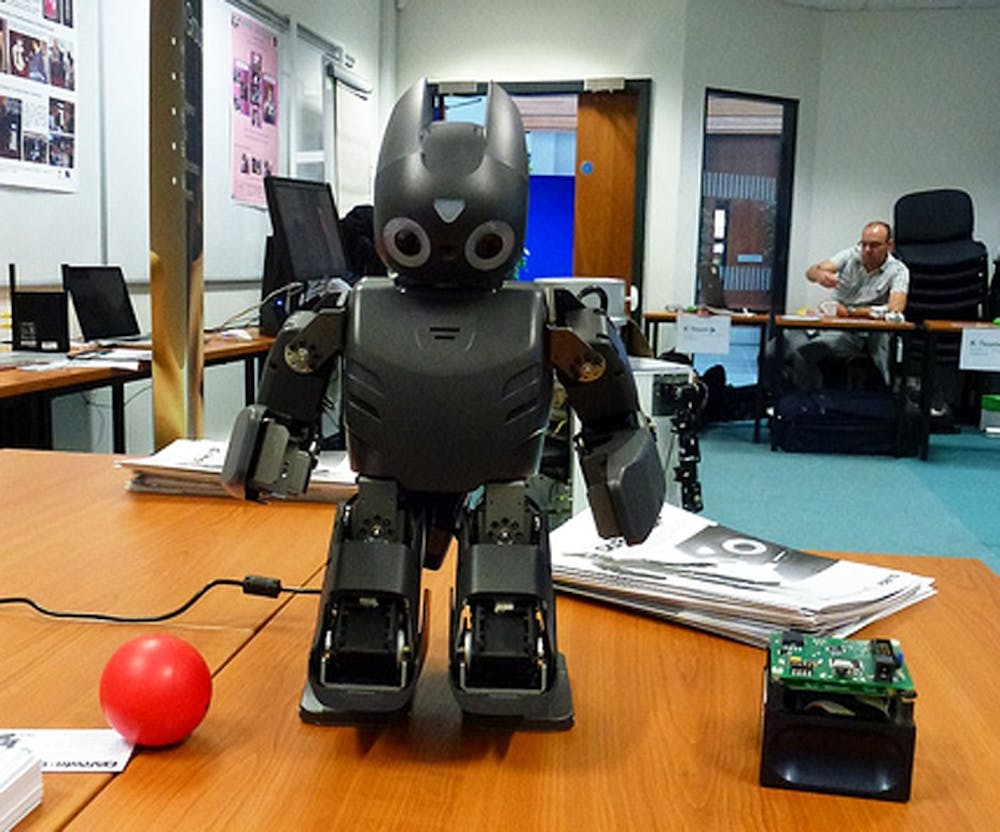
The UPennalizers and Team DARwIn go for the goal with their soccer-playing robots in RoboCup 2012. The competition, which took place from June 18 to June 24 in Mexico City, drew student teams from around the world.
Credit: Creative CommonsPenn’s latest athletic title belongs to a team of robots.
The robots were led to victory by twelve undergraduate and graduate students who competed in the RoboCup 2012 competition in Mexico City, which was held from June 18 to June 24.
Team DARwIn — which consisted of five Penn students and one Virginia Tech student — took first place in the Kid Sized division of the Humanoid League, defeating 21 other teams from across the world. In this division, teams of three robots — which have human-like body designs and sense and are 30-60 centimeters in height — competed in a soccer match.
Another Penn team, the UPennalizers, made it to quarterfinals before losing to the Australian team. They competed in the Standard Platform League, which involves using identical, autonomous robots.
Rising Engineering junior Spencer Lee, a member of UPennalizers, explained that the while DARwIN — which stands for Dynamic Anthropomorphic Robot with Intelligence — is a branch of UPennalizers, the two teams worked together to prepare for the competition.
Lee added that the teams have already made significant strides in their robot strategy.
“Our vision, motion planning and even our localization engines have been updated, and we even made use of sound to help the robots find their positions on the field this year,” he wrote in an email. “In the future, we’d like to have an even faster walk, a method of detecting other robots on the field and possibly a new means of localization with two yellow goals.”
Penn’s foray into competitive robot soccer began in 1999, through the work of the General Robotics, Automation, Sensing and Perception laboratory. The lab, which offers both undergraduate and graduate courses, uses computer science, mechanical and electrical engineering to research and make technological advances in robotics.
RoboCup was established in 1997 to work on advancing intelligent robots. The organization aims to create a team of robots by 2050 that can win against the human soccer World Cup champions, according to its official website.
RoboCup has also branched into other areas of robotics, such as using robots to assist humans in medical emergencies, daily and home life, and teaching children necessary scientific and mathematics skills through building robots. The annual competitions bring teams from around the world to face off in each of these divisions.
“Competitions in robotics are very important to helping the advancement of robotics in general,” Lee wrote. “Playing a game of soccer is a very complex situation, and trying to plan for that environment yields systems which can be used in myriad applications.”
According to Lee, there are plans to use the UPennalizers’ code base — which is open source and available to the public online — to create boxers and even firefighters.
Organizations like RoboCup can also bring significant breakthroughs in the fields of robotics and artificial intelligence by teaching its participants vital skills. Robotics masters student Aditya Sreekumar, who joined UPennalizers team year, said he had to learn how to code, test and run the robot’s functions.
“When you have set goals and time frames it makes you work even harder towards that goal, while also improving the field of robotics,” said Sreekumar, who plans to work on the team again next year.
“Tasks like object recognition in these competitions can be applied to the real world, such as in rescue operations,” he added.
The Daily Pennsylvanian is an independent, student-run newspaper. Please consider making a donation to support the coverage that shapes the University. Your generosity ensures a future of strong journalism at Penn.
DonatePlease note All comments are eligible for publication in The Daily Pennsylvanian.





